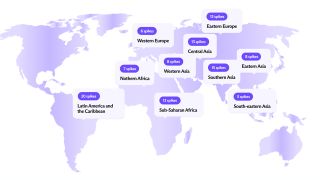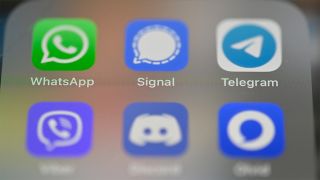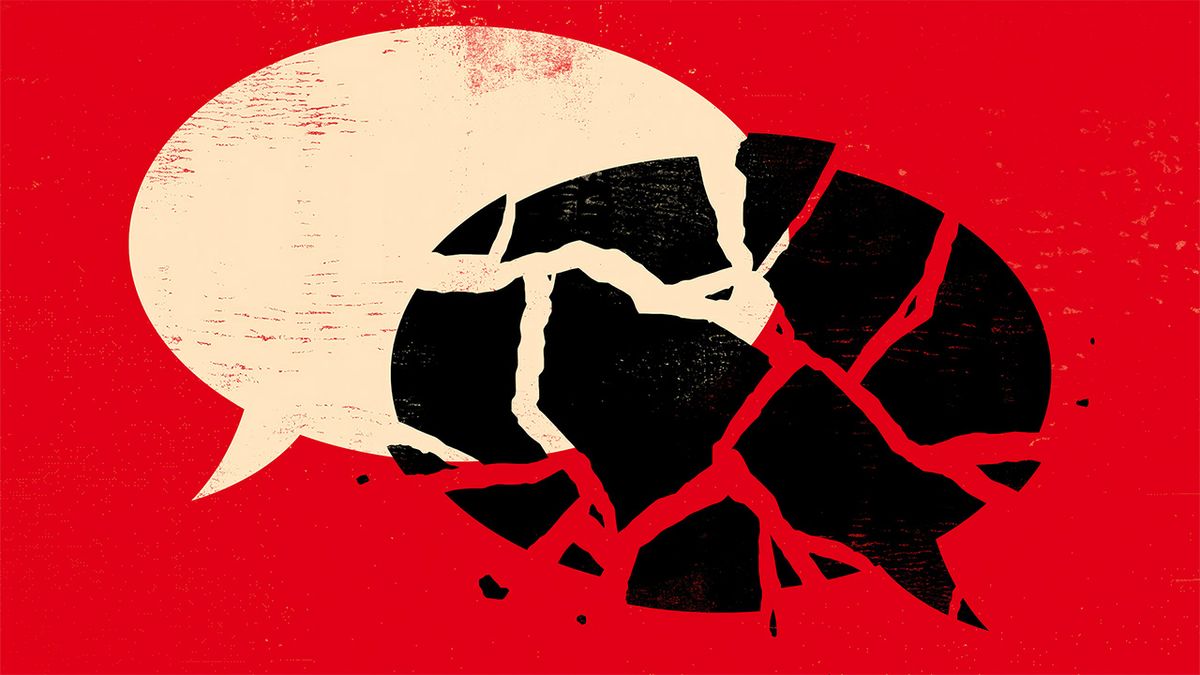The struggle against online censorship continued in 2024, as over half the world's population experienced internet restrictions.
Authoritarian governments are increasingly turning to censorship to silence dissent, limit information, and manipulate public opinion, with internet freedom and democracy at risk.
Two of the best VPNs, Proton VPN and Surfshark have analyzed the restrictions taking place over the last year, and highlighted the importance of VPNs in combating internet censorship.
We will take a closer look at the events of 2024 and raise awareness of how people can fight back against internet censorship and take control of their digital freedoms and privacy.
63 new restrictions
Research from Surfshark, the best cheap VPN, found that 63 new internet restrictions were introduced in 2024, affecting 17 countries and 4.8 billion people – up from 4.4 billion in 2023.
43 of those restrictions took place in Asia, with 7 countries affected. India alone imposed 23 restrictions, which was a significant increase from the 11 it introduced in 2023.
In 2022, India passed strict data laws which required VPN providers to record and store information about their users – directly contravening their commitment to users and one of the very reasons people use VPNs.
As a result of these laws, many leading VPN providers withdrew their servers from India and some top VPNs were hit with an app store ban in the country.
Pakistan was another Asian country imposing restrictions on its citizens, as 8 hit the country. In November 2024, the country experienced a VPN shutdown, with the government then attempting to combat VPN usage. Social media was also affected, as Bluesky was blocked and WhatsApp faced restrictions.
17 new restrictions hit Africa, with 8 of those coming in Mozambique. The country had its internet access restricted and social media blocked in response to ongoing protests disputing the result of recent government elections.
"We are witnessing a deeply concerning global trend: the number of people impacted by internet shutdowns continues to rise. In 2024 alone, 4.78 billion people were affected by disruptions tied to key events like elections, protests, and political unrest," said Luís Costa, Research Lead at Surfshark.
We are witnessing a deeply concerning global trend: the number of people impacted by internet shutdowns continues to rise.
"In 2024, five new countries – Comoros, Kenya, Mauritius, Mozambique, and El Salvador – added their names to the growing list of nations imposing internet restrictions for the first time, further underscoring the troubling global surge in government-mandated digital blockages."
Protests and government elections were a significant driving force in the implementation of internet restrictions, and something highlighted in Proton VPN's 2024 End of Year Report.
All eyes on elections
2024 was a record-breaking year for democracy as 64 countries held elections. However many of these elections took place against the backdrop of tampering, censorship, and the silencing of political opponents and protestors.
In response, Proton VPN provided additional free VPN servers in 21 countries for at least 2 weeks before and after election day and ensured people could access the internet unrestricted.
The Proton VPN Observatory records spikes (a sudden increase of over 100% over the baseline) in signups to Proton VPN, and these were observed in 119 countries in 2024.
20 countries saw at least one spike in signups of over 1,000%, 6 saw at least one spike of over 5,000%, and 4 saw at least one spike of over 10,000%.

The previously mentioned Mozambique saw Proton VPN signups of 800% over the baseline as the ruling party FRELIMO was accused of preparing to rig the election taking place in October.
Strikes and mass protests emerged following the election result, a FRELIMO victory, with widespread fraud alleged and significant irregularities observed. This led to a second spike in signups of 127,830% over the baseline.
Venezuela was another country facing political unrest, as the re-election of President Nicolas Maduro was disputed. X and Telegram were blocked, and over 20 VPNs were reported to have been banned.
During this period, Proton VPN saw signups of 51,000% over the baseline and its app became the most downloaded in the country on Google Play and the App Store.
Elections not the only cause
Although elections remain a primary catalyst for internet restrictions, they can occur at any time.
The restrictions in India and Pakistan took place outside of an election period and restrictions taking place in other countries proved censorship can take place at any time.
VPNs came under attack in Myanmar as a new security law was introduced by the ruling military junta. The laws set out a penalty of six months in prison and fines of up to $4,750 for "unauthorized VPN installation."
Earlier on in 2024, Proton VPN saw a 2,700% spike in VPN signups and in May, many VPN providers failed to work and social media was blocked. A report by Top10VPN found that Myanmar experienced 8,784 hours of internet shutdown, costing the economy $1.58 billion.

In December, Russia disrupted internet connections across several regions in an apparent test of its "sovereign internet" infrastructure. It was reported that internet access was restricted, even when using a VPN, and many have claimed that this was the latest step in Russia's attempt to cut itself off from the global internet.
Russia, along with China, are just two countries where ongoing internet restrictions are present. According to Surfshark, 2024 began with 53 restrictions already in place, with some being there for over 15 years.
Oman, Iran, China, and Turkmenistan were all given as examples of countries who imposed long-term social media restrictions in 2009 and are still in place today.
Social media a prime target
Social media is a common target of internet restrictions, with X (formerly Twitter), WhatsApp, Bluesky, and Telegram all experiencing restrictions in 2024.
Surfshark reported that social media made up a third of all restrictions in 2024, a 33% increase from a quarter in 2023.
Facebook was the most frequently blocked social media platform, facing restrictions from 5 governments on 9 occasions in 2024. X, YouTube, and Instagram recorded 6 cases each, with Telegram recording 3.
WhatsApp faced the longest restriction, averaging 106 days. This was a change from 2023, which saw YouTube experiencing an average of 123 days restricted. In 2024, the average restriction across all social media platforms was 13 days.
Trends declining?
Despite the worrying numbers from 2024, it does appear as though we are seeing a decrease in the number of global internet restrictions.
Surfshark reported a 17% decrease in the number of new restrictions in 2024, compared to 2023 (63 cases vs 76), and the figure was nearly a third lower than the 89 recorded in 2022.
The number of countries with new internet restrictions also decreased, with the 17 in 2024 down from the 36 in 2023.
Despite the decrease, the total number of people affected by restrictions rose from 4.4 billion to 4.8 billion – 2.6 billion of those were impacted by new restrictions.
But we cannot become complacent and must continue to fight against all forms of internet restriction and censorship. Restrictions are not going away, and this was highlighted by the fact there was a notable increase in the number of long-standing restrictions in place at the beginning of 2024.
53 ongoing cases were recorded at the start of the year, up from 40 in 2023, and significantly more than the 23 at the start of 2022.
How can we combat restrictions?
The main takeaway from these pieces of research is how important it is for internet restrictions and censorship to be challenged, and VPNs can play a crucial role.
VPNs encrypt internet traffic and hide it from third-parties and government surveillance. They mask your IP address, making it appear as though you're browsing the internet from a different country and providing much needed access to the internet in countries where it is restricted.
The most secure VPNs are a reliable way of bypassing restrictions and protect you with class-leading privacy. The best free VPNs, including Proton VPN Free, also act as a much needed lifeline for those who might not be able to afford a premium VPN subscription.
Even though they are free, these VPNs still encrypt internet traffic and protect users online – just don't expect a ton of extra features.
NordVPN, the best VPN overall, has just introduced NordWhisper. Its new VPN protocol is designed to navigate network restrictions and provide users with secure and reliable internet access in challenging environments.
NordWhisper avoids detection by mimicking regular web traffic and overcoming advanced network filters and blocking tactics.

Proton VPN has also introduced a range of features designed to protect the internet freedoms of people around the world, especially in challenging environments.
Its "guest mode" for Android enables people to download Proton VPN and log in for free without needing any credentials or account creation. Selecting "continue as guest" automatically connects users to one of the servers available on Proton VPN's free plan.
Authoritarian governments often search phones for VPN apps, as seen in Myanmar, so Proton VPN has added discreet icons that allow you to disguise Proton VPN.
VPNs have become essential tools as governments around the globe increasingly rely on online censorship to stifle dissent and exert control
Its stealth protocol is an effective way of avoiding attempts to block VPNs and this feature is available on any Android, iPhone, Mac, or Windows device. Proton VPN also offers a free browser extension for Chrome and Firefox enabling VPN protection without the need to download or install an app on your device.
David Peterson, Proton VPN's General Manager said: "VPNs have become essential tools as governments around the globe increasingly rely on online censorship to stifle dissent and exert control."
"Social media blocks and internet blackouts have sadly become normalized and are now viewed as simply another tool governments can turn to. VPNs give everyday citizens the ability to fight back against thus encroaching censorship."
Protection beyond VPNs
VPNs are not the only tool capable of protecting internet freedoms. VPNs focus on privacy and "safety in numbers," but if you're looking for anonymity, then the Tor browser might be worth exploring.
Tor utilises the "Onion network" and routes your traffic through a series of volunteer-operated nodes. Each time your data is transferred, a layer of encryption is stripped away and this means no one node knows the entire route of your traffic.
There is some risk when using Tor, due to the voluntary nature of the nodes, but a VPN can be used alongside the browser and this combination provides the greatest level of protection.
If you're concerned about your messages being intercepted, then the best encrypted messaging apps can offer protection. Signal is our top choice here and provides end-to-end encryption for all your messages, voice calls, and group chats.
You do need a phone number to sign up for Signal, but it is the best option for secure messaging.

Telegram is another good choice for encrypted messaging, and has now grown into a wider social media platform. However, end-to-end encryption isn't enabled by default and chats with more than two participants cannot be encrypted – like Signal, you do need a phone number to sign up.
But whether it's VPNs, Tor, or encrypted messaging apps, people worldwide are going to need to take internet freedom into their own hands and work together to fight back against oppressive censorship.
Restrictions will not go away unless awareness is spread and we stand up to authoritarian governments, protecting our digital rights and combating internet censorship.
Disclaimer
We test and review VPN services in the context of legal recreational uses. For example: 1. Accessing a service from another country (subject to the terms and conditions of that service). 2. Protecting your online security and strengthening your online privacy when abroad. We do not support or condone the illegal or malicious use of VPN services. Consuming pirated content that is paid-for is neither endorsed nor approved by Future Publishing.















)





 English (US) ·
English (US) ·